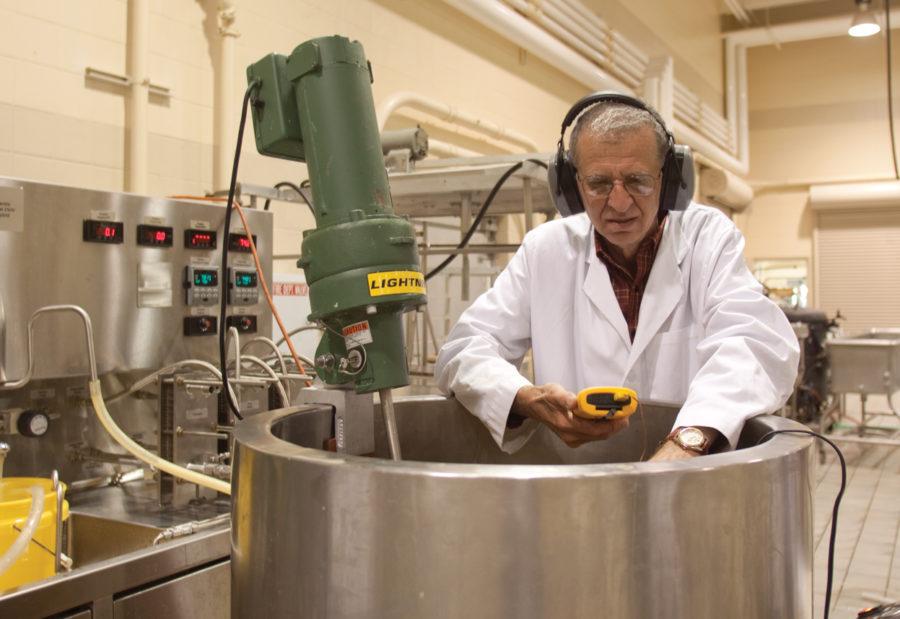Professor awarded for cereal grain research
Photo: Whitney Sager/Iowa State Daily
Larry Johnson, professor of food science and human nutrition and director of the Center for Crops Utilization Research, checks the water-based extraction of soybeans in a mixing tank before the product moves on to the next processing step. Johnson was named the 2010 recipient of the Applied Research Award from the American Association of Cereal Chemists for his research in corn and soybean processing.
November 8, 2010
The compilation of more than 20 years of cereal grain research has paid off for one ISU professor.
Larry Johnson, professor of food science and human nutrition and director of the Center for Crops Utilization Research, was recently chosen as the 2010 recipient of the Phil Williams Applied Research Award by the American Association of Cereal Chemists International.
The award is one of the highest honors the AACC gives to researchers. Recipients of the award must have made “a significant body of distinguished contributions to the application of science in the cereals area,” according to the AACC’s website.
Though Johnson said he was aware of his nomination for the award, he did not expect to receive it.
“It’s always a pleasant surprise to receive these awards,” Johnson said.
Johnson has an extensive list of corn and soybean research projects he has worked on over the years. His research has focused on finding new processing methods for the cereals and making different products using those methods.
“I’m motivated to find new uses for corn and soybeans for farmers to be more profitable,” Johnson said.
The most significant project Johnson said he has worked on involves the extraction of oil and protein from soybeans.
Hexane, a petroleum distillate that is used to complete the extraction process, has been found to be dangerous to humans and the environment. Johnson and several of his colleagues have found a new way to complete the extraction process using a combination of enzymes and water.
“The process allows simultaneous extraction of oil and protein from soybeans without using hazardous and polluting solvents such as hexane,” said Juliana Nobrega, post-doctoral research associate in food science and human nutrition.
Johnson said this method of extraction is not only safer for humans but is also greener.
Johnson’s interest in cereal grain research was the result of his talent in the science and chemistry fields and lack of proficiency in engineering.
“I was never good enough at engineering to get an engineering degree,” Johnson said.
Not only does Johnson conduct research, he also coordinates research projects ISU students and faculty conduct at the Center for Crops Utilization Research.
“Under Dr. Johnson’s leadership, CCUR has become a nationally and internationally recognized platform where engineers, scientists and entrepreneurs work abreast to develop new technologies to process Iowa’s bounty harvest and beyond into new food, feed, biofuel and biorenewable materials,” said Hui Wang, pilot plant manager at the Center for Crops Utilization Research.
Nobrega said Johnson’s personality and academic background make him a good leader.
“Besides his vast scientific knowledge, his forwarding-looking vision and his capacity to inspire, to engage and to help people make him an excellent leader,” Nobrega said.
In addition to research, Johnson has also co-authored two books — “Soybeans: Chemistry, Production, Processing and Utilization” and “Corn: Chemistry and Technology” — both of which have become international references for corn and soybean research.
Johnson credits his success to the faculty and staff members and graduate students at Iowa State, along with his supportive family.
“It takes all those things to be successful,” Johnson said. “Iowa State has afforded me with remarkable opportunities.”

















